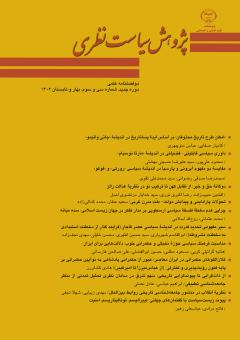دوگانۀ حق و خیر: از تقابل کهن تا ترکیب نو در نظریة عدالت رالز
محورهای موضوعی : Research in Theoritical Politics
افشین حبیب زاده
1
,
رضا اکبری نوری
2
,
سیدخدایار مرتضوی اصل
3
![]()
1 - دانشجوی دکتری تخصصی علوم سیاسی، واحد تهران جنوب، دانشگاه آزاد اسلامی
2 - استادیار علوم سیاسی، واحد تهران جنوب، دانشگاه آزاد اسلامی، تهران
3 - استادیار علوم سیاسی، واحد تهران جنوب، دانشگاه آزاد اسلامی، تهران
کلید واژه: خیر, حق, جان رالز و نظریۀ عدالت, برابری. ,
چکیده مقاله :
تأسیس مفهوم و نظام عدالت از موضوعات مهم اندیشه و فلسفۀ سیاسی و اخلاقیات از عهد باستان تاکنون بوده است. در تاریخ اندیشه، اغلب باورها دربارة عدالت، بنیان خود را بر ایدهای عالی از خیر نهادهاند و گاه مقدماتی در باب خیر فراهم کردهاند که از آن میتوان نظامی از حق و عدالت را استنباط کرد. با این حال تقابل میان حق و خیر به عنوان مفاهیمی که به دو نظام متفاوت از عدالت میانجامند، از مباحث مهم و طولانی اندیشه سیاسی بوده است. اهمیت بحث در آن است که تقدم مفهومی یکی بر دیگری میتواند تبعات گستردهای در زندگی اجتماعی- سیاسی یک جامعه داشته باشد. «جان رالز»، فیلسوف سیاسی پرنفوذ سدة بیستم، کوشیده تا ترکیبی از مفاهیم حق و خیر را در نظریة عدالت خود مطرح کند، به نحوی که حق از ایدههای خیر قابل استنباط شود و خیر تابع نظام عدالت به عنوان شعبهای از مفهوم حق باشد. در این مقاله، تبیین و تفسیری از تلاش پیچیدۀ رالز برای ترکیب دو مفهوم متقابل حق و خیر و نیز چگونگی تقدم منطقی حق بر خیر در نظریة عدالت ارائه میدهیم.
Establishing the concept and system of justice has been one of the important subjects of political thought and philosophy and ethics since ancient times. In the history of thought, most of the beliefs about justice have been based on a great idea of good and sometimes they have provided some preliminaries about good from which a system of right and justice can be deduced. However, the opposition between right and good as concepts that lead to two different systems of justice has been one of the important and long-standing topics of political thought. The importance of the discussion is that the conceptual superiority of one over the other can have wide consequences in the socio-political life of a society. In the discussions of contemporaries, the distinction or opposition of these two concepts was at the center of the debate between the schools of consequentialism and dutyism: consequentialists consider good to be the first and right actions are those that lead to good; Duties put the right first, consider it independent of good, and even prohibit the actions leading to good when they are exposed to fundamental moral rules. But John Rawls tried to propose a combination of the concepts of right and good in his theory of justice in such a way that right can be deduced from the ideas of good, and good is subject to the justice system as a branch of the concept of right. John Rawls's system of justice is a political system based on a political conception of justice that tries to provide an explanation of the requirements for realizing the greatest possible freedom and equality for the citizens of a democratic society. In fact, this structure can be considered as the "rule of law" which both enables the freedom of citizens to pursue their own good and sets limits for it so as not to violate the principles of justice.
